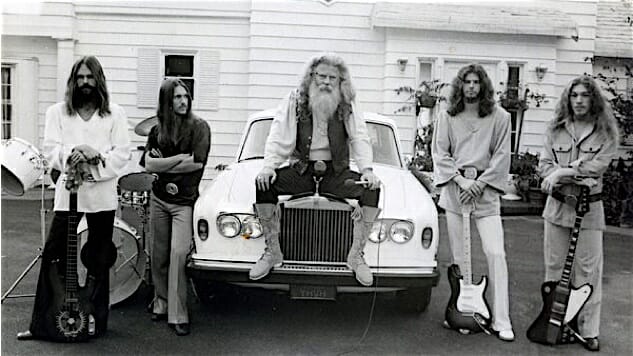
Other countries have their characters too, but the United States seems to be particularly fertile ground for cultivating spiritual outliers—some odd but benign, others clearly dangerous—whose appeal is magnetic to a few, and mystifying to the rest of us. Here are just a few of the many documentaries that explore the gray area between religion and cult.
1. Waco: The Rules of Engagement (1997)

The makers of Waco: The Rules of Engagement, would dispute its inclusion on this list, as its overarching argument is that the Branch Davidians—the Christian sect whose Texas compound burned to the ground after a 51-day standoff with the federal government in 1993—were not a cult. More than 80 Branch Davidians, including their leader, David Koresh, lost their lives in the incident, as did four federal agents. Featuring interviews with survivors, scholars and law enforcement; excerpts from taped FBI negotiations; and footage from Congressional hearings on the tragedy, this critically acclaimed documentary calls into question the government narrative of the “Waco seige.” —Allison Gorman
2. Jesus Camp (2006)

This hard-to-watch film, which debuted in 2006 at the Tribeca Film Festival, follows three children who attend a charismatic Christian summer camp called Kids On Fire in North Dakota. The kids speak in tongues, believe global warming is a political conspiracy and bless a cardboard cutout of George W. Bush. There’s no need for a narrator or editorial opinion—the footage says it all. It’s no surprise that the camp closed after the film’s release. —Kate Kiefer
3. Jonestown: The Life and Death of People’s Temple (2006)

The big selling point of this documentary—besides its inherently compelling storyline, about a charismatic man who ultimately coerces 900 people into poisoning themselves—is its inclusion of so much footage taken from inside Jim Jones’s cult. Blending principles of communism, Christianity and racial equality, Jones established the People’s Temple in Indianapolis in the 1950s, and then moved to San Francisco and finally to Guyana, getting crazier along the way. By 1978, he was a paranoid drug addict under investigation for human rights abuses at the cult’s outpost at “Jonestown,” where a fact-finding visit from Rep. Leo Ryan turned fatal for the congressman—and triggered an unprecedented American massacre. —Allison Gorman
4. The Source Family (2012)

A fascinating chronicle of how one violent, star-fucking sociopath can be charming enough to make even the most batshit ideas seem legitimate, The Source Family follows James Edward Baker as he builds a popular health food restaurant in Hollywood into a thriving spiritual cult. Though the details of Baker’s ascension to being Father Yod, leader of the Source Family and self-proclaimed God (yep, that God), are compelling in themselves—especially Baker’s dedication to psych music early in the genre’s development, as well as his adoption of polygamy, which he defended with pretty lame reasons—the film’s nearly obsessive glut of interviews with practically every prominent Source Family member paints a picture of such ballsy manipulation on Baker’s part that one can’t help but look back at the ’70s as a time of deeply depressing spiritual malaise. Long after his death, Father Yod’s “beliefs” still have a few devotees, despite those beliefs never really offering any sort of coherent theology, but paired with interviews detailing the PTSD of Yod’s first wife, among other examples of fall-out, the range of The Source Family’s testimonials provides a terrifying addendum to a decade of supposedly expanded “awareness.” —Dom Sinacola
5. Going Clear: Scientology and the Prison of Belief (2015)

Based on Lawrence Wright’s 2013 book—and the 2011 New Yorker piece that inspired it—Going Clear is a methodical deconstruction of the Church of Scientology. Oscar-winning director Alex Gibney’s documentary will tell you what you may already know about the religion founded by prolific science-fiction writer L. Ron Hubbard: how it indoctrinates new members, cultivates celebrity practitioners and intimidates those who speak out against the Church. But if the film’s value as an exposé is limited, Going Clear is sterling as an official record of condemnation. What’s so fascinating about the film is Gibney’s interest in how people blind themselves to logic in order to find some sort of reason in their lives. —Tim Grierson